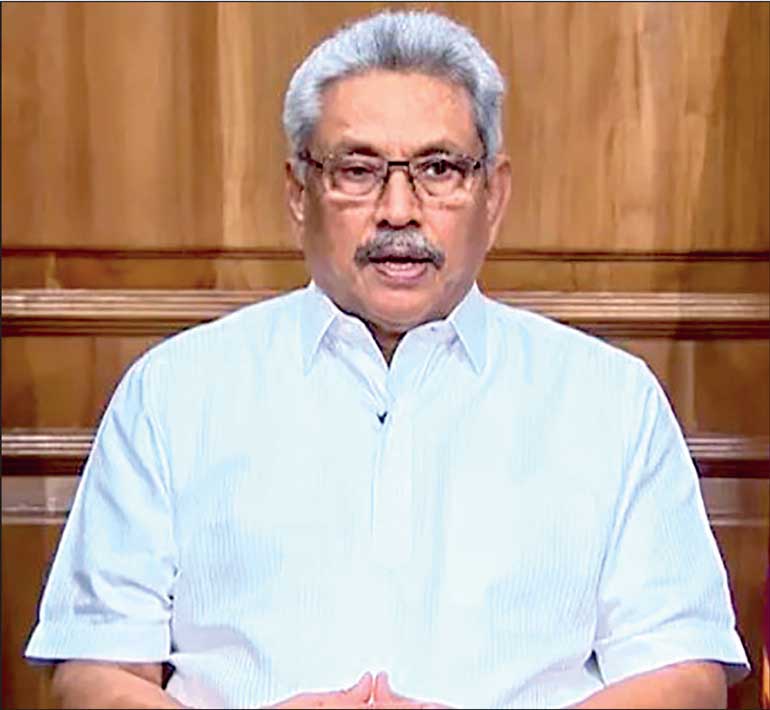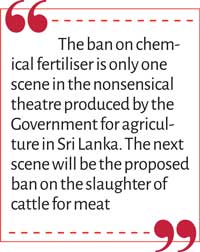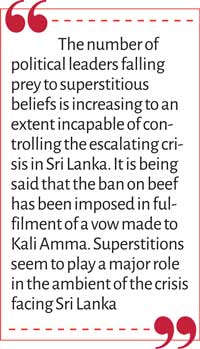Thursday Feb 19, 2026
Thursday Feb 19, 2026
Friday, 29 October 2021 00:05 - - {{hitsCtrl.values.hits}}

President Gotabaya Rajapaksa is only a temporary custodian of the country, not the owner. He has no right to risk the very existence of the common good of the country but to pursue a policy of protection and development
 Sri Lanka’s plunge into a catastrophe is becoming an inevitable historic reality. The way the ruling party and the Opposition work contributes to confirm this reality. It can be said that all regulatory checks and balances have collapsed.
Sri Lanka’s plunge into a catastrophe is becoming an inevitable historic reality. The way the ruling party and the Opposition work contributes to confirm this reality. It can be said that all regulatory checks and balances have collapsed.
The most frightening aspect evident in this crisis is that the Head of State is a novice who does not seem to know the governing traditions that he is required to uphold. No matter how powerful the presidency is, there are things that the incumbent should not do at all, under any circumstance.
The lack of profound understanding of the difference between the dos and don’ts can also be seen as an important contributing factor for the failure of President Gotabaya Rajapaksa. He is only a temporary custodian of the country, not the owner. He has no right to risk the very existence of the common good of the country but to pursue a policy of protection and development.
Ban on chemical fertiliser
The President's policy on banning chemical fertiliser and pesticides is not only unconventional, but also arbitrary and irresponsible. The cost of damage caused to agriculture in Sri Lanka by this decision has not been projected. The quantum of damage can be very large.
The President has stated to the nation that it has been done to save the people from the Chronic Kidney Disease (CDK) allegedly linked to the toxic exposure caused by the use of agrochemicals. But, scientific research has not confirmed that the chemical fertilisers or pesticides are the cause of it. The actual cause of it has not been identified and it is yet to be explored.
Linking Chronic Kidney Disease to use of agro chemicals can be considered as a myth created and socialised by a certain school of thought attired in a patriotic garb. It can be compared to the story of pills allegedly meant to cause infertility in Sinhala women which led to create a Muslim phobia, in the recent past.
Both these episodes can be considered as rumours fabricated and socialised by the same school of thought which led to frighten the people. It also appears that some leaders of this extremist school of thought have become close advisers to the president.
Following the banning of chemical fertiliser and pesticides, the only option available was to direct the country to the cultivation based on organic fertilisers. No country in the world except Bhutan has abandoned the use of chemical fertilisers completely and switched to organic fertilisers despite there were critical opinions against the use of chemical fertilisers. Even Bhutan has revised its ambitious plan as its efforts have not been successful.
chemical fertilisers. Even Bhutan has revised its ambitious plan as its efforts have not been successful.
Despite decades of massive global hype for organic farming, so far it is only less than 2% of the world's cultivated area dedicated for organic farming. The concept of organic farming is beautiful, but not practical. The yield of organic crops is relatively low. The cost of production remains very high and they are cultivated not for the common people but for the consumption by the rich who can afford them at a high price.
It does not seem that the President has taken the global reality of organic cultivation into account when the decision was taken to convert the agriculture of Sri Lanka to organic farming in its entirety. The President’s assertion that Sri Lanka could make a great stride in agriculture along, if the entirety of it, is converted to organic farming, can be considered as a fanciful delusion without a real basis.
Initially, the dream was to produce the entire stock of organic fertiliser needed for Sri Lanka, locally. When it was found impractical, a large consignment of carbonic fertiliser claimed to have been manufactured with Chinese sewage was imported to the country. It was reported that the vessel that carried the consignment of carbonic fertiliser from China was sent back twice after it failed the quarantine tests. But it is said to have been shipped again for the third time.
Priyavanda Ranatunga, Professor of Plants Pathology, University of Ruhuna, has warned that, "If this consignment of fertiliser is applied to our soil, the error would never be able to be corrected."
Dairy farming
The ban on chemical fertiliser is only one scene in the nonsensical theatre produced by the Government for agriculture in Sri Lanka. The next scene will be the proposed ban on the slaughter of cattle for meat.
The first scene (ban on chemical fertiliser) led to the destruction of agricultural crops. The second (ban on the slaughter of cattle) could lead to complete destruction of the entire animal husbandry in the country, starting with dairy farming. The cattle population in Sri Lanka (excluding buffaloes) is three million. There are 400,000 dairy farmers in Sri Lanka. Sri Lanka produces 35% of its milk requirement locally. Sri Lanka spends nearly $ 350-400 million a year to import milk powder and dairy products.
Although Sri Lanka has a real potential for self-sufficiency in milk, it has not been able to achieve it because Sri Lanka does not have a realistic and consistent policy on the production of beef. Raising cattle only for milk is not economically viable. It becomes a feasible economic activity only if the cattle are raised to produce both milk and meat.
The average number of calves born in a cattle farm consists of about 50% males and 50% females. In countries where the cattle farming is pursued as a business, it is common practice to allow all newborn calves to feed on the milk of their heifers for six months without sex distinction. Thereafter they are reared separately, the female calves for milk and most of the male calves for meat.
Some of the male calves are slaughtered for veal at five months of age and the rest are slaughtered for beef in 12 months. The average lifespan of a cow is 20 years. But even dairy cows are slaughtered for meat between the ages of 7-8 as beyond that age the ability to produce milk tends to decrease making it no longer economically viable to maintain them.
Strangling the dairy farmer
With the ban on the cattle slaughter, cattle rearing has become economically nonviable. Under the old system, all newborn calves were reckoned as a part of extra profits. With the new law, the picture is turned upside down. What is to be done with the 50% of the male calves born in a cattle farm? Should they be killed as soon as they are born? Why should they be maintained at great expense if there is no economic benefit to be gained from them?
The quantity of milk that a mother cow should feed a calf is estimated to be around 300 litres. The value of milk alone is Rs. 30,000. This implies that if the calf is not raised, it must be sold for a price above Rs. 30,000. The dairy farmers in rural villages do not look after the cows until they grow old and are dead. After some time, they sell the cow when the quantity of milk extracted is diminished. Consequently, the dairy farmer receives a large sum of money at once; that is how the economic cycle of the dairy industry is structured.
alone is Rs. 30,000. This implies that if the calf is not raised, it must be sold for a price above Rs. 30,000. The dairy farmers in rural villages do not look after the cows until they grow old and are dead. After some time, they sell the cow when the quantity of milk extracted is diminished. Consequently, the dairy farmer receives a large sum of money at once; that is how the economic cycle of the dairy industry is structured.
With the ban on the slaughter of cattle, the dairy farmer loses the opportunity to earn an extra income from the sale of males. At the same time, killing the cattle becomes a violation of the law, and rearing them an unbearable economic burden. This affects the rearing of cows in a different way.
The dairy farmer is deprived of the opportunity to sell the cow and earn a substantial sum of money when the animal is no longer economically viable with the reduction of the quantity of milk it produced. The biggest burden on dairy farmer would be that they are compelled to maintain the cows and look after them for 10 to 12 years until they die without any income.
The Government has been able to adopt such destructive and stupid policies in regard to the ban on chemical fertiliser and slaughter of cattle for meat mainly because the Opposition does not have a firm policy on both issues as in several other issues. When the use of chemical fertiliser and pesticides were banned shifting the entirety of agriculture to organic farming, all the Opposition parties held the view that switch to organic farming was a good move, but it should have been implemented gradually and over a time. This shows that there is not much difference between the way the President and the leaders of the various Opposition parties think. This stupid policy was in practice in a different way during the Yahapalana regime also.
In the final analysis, the people will be convinced that the way the President thinks about it is correct though there was confusion in the way it has been implemented. If there was a possibility of a gradual transition to organic farming the political parties should explain it to the country and point out as to how it could have been done. Are they prepared to do it?
Although the devastation caused to animal husbandry by the ban on the slaughter of cattle is immense, it is most unlikely that the Opposition will speak out against this destructive policy except remain silent on the issue.
Entrusting the nation to Kali Amma
Beef is forbidden for Hindus, but not for Buddhists. Hindus worship the cow as a divinity. India is generally considered a country where beef is not consumed except in certain Province like Goa, Kerala, Tamil Nadu, Nagaland and West Bengal. Yet, it occupies the fourth largest place amongst the countries in the world which export beef; about seven or eight years ago, India was ranked number one amongst the countries exporting beef.
In Sri Lanka, meat consumption including beef remains at a very low level. Per capita annual consumption of meat in Sri Lanka is 6.05 kgs. The world average is 43.70 kgs. Meat consumption in other Buddhist countries in the world remains relatively high compared to Sri Lanka. It is 18.06 kgs in Cambodia, 28.29 kgs in Thailand, 44.69 kgs in Myanmar, 24.63 kgs in Laos and 87.89 kgs in Mongolia. Sri Lanka is considered a protein malnourished country. The ban on cattle slaughter will lead to a major breakdown in animal husbandry in Sri Lanka and exacerbate protein malnutrition.
The number of political leaders falling prey to superstitious beliefs is increasing to an extent incapable of controlling the escalating crisis in Sri Lanka. It is being said that the ban on beef has been imposed in fulfilment of a vow made to Kali Amma. Superstitions seem to play a major role in the ambient of the crisis facing Sri Lanka. In Hinduism, Kali Amma is considered to be the goddess of lust and violence. It maybe that the rulers of Sri Lanka believe that a great sacrifice made to her will help save Sri Lanka along with themselves.